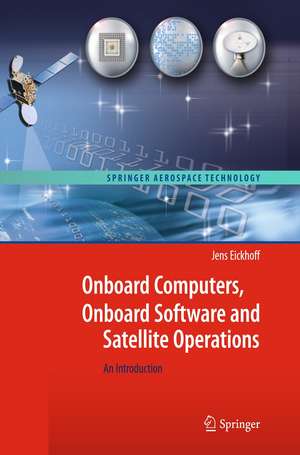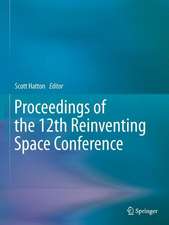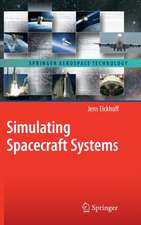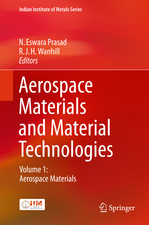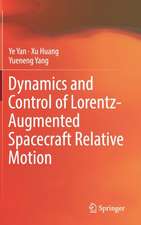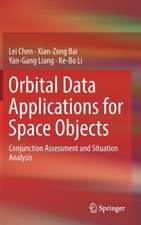Onboard Computers, Onboard Software and Satellite Operations: An Introduction: Springer Aerospace Technology
Autor Jens Eickhoffen Limba Engleză Hardback – 7 dec 2011
The features of today’s onboard computers are explained at hand of their historic evolution over the decades from the early days of spaceflight up to today. Latest system-on-chip processor architectures are treated as well as all onboard computer major components.
After the onboard computer hardware the corresponding software is treated in a separate part. Both the software static architecture as well as the dynamic architecture are covered, and development technologies as well as software verification approaches are included.
Following these two parts on the onboard architecture, the last part covers the concepts of spacecraft operations from ground. This includes the nominal operations concepts, the redundancy concept and the topic of failure detection, isolation and recovery.
The baseline examples in the book are taken from the domain of satellites and deep space probes. The principles and many cited standards on spacecraft commanding, hardware and software however also apply to other space applications like launchers. The book is equally applicable for students as well for system engineers in space industry.
| Toate formatele și edițiile | Preț | Express |
|---|---|---|
| Paperback (1) | 1160.84 lei 38-44 zile | |
| Springer Berlin, Heidelberg – 23 aug 2016 | 1160.84 lei 38-44 zile | |
| Hardback (1) | 1337.35 lei 6-8 săpt. | |
| Springer Berlin, Heidelberg – 7 dec 2011 | 1337.35 lei 6-8 săpt. |
Din seria Springer Aerospace Technology
- 18%
 Preț: 782.42 lei
Preț: 782.42 lei - 18%
 Preț: 891.33 lei
Preț: 891.33 lei - 18%
 Preț: 897.65 lei
Preț: 897.65 lei - 18%
 Preț: 944.19 lei
Preț: 944.19 lei - 18%
 Preț: 1112.30 lei
Preț: 1112.30 lei - 18%
 Preț: 779.26 lei
Preț: 779.26 lei - 20%
 Preț: 565.17 lei
Preț: 565.17 lei - 18%
 Preț: 987.11 lei
Preț: 987.11 lei -
 Preț: 366.33 lei
Preț: 366.33 lei - 18%
 Preț: 949.73 lei
Preț: 949.73 lei - 20%
 Preț: 629.52 lei
Preț: 629.52 lei - 24%
 Preț: 855.08 lei
Preț: 855.08 lei - 15%
 Preț: 583.78 lei
Preț: 583.78 lei - 15%
 Preț: 579.84 lei
Preț: 579.84 lei - 18%
 Preț: 1112.60 lei
Preț: 1112.60 lei - 18%
 Preț: 947.35 lei
Preț: 947.35 lei - 23%
 Preț: 1611.32 lei
Preț: 1611.32 lei -
 Preț: 455.78 lei
Preț: 455.78 lei - 15%
 Preț: 581.98 lei
Preț: 581.98 lei - 18%
 Preț: 1112.15 lei
Preț: 1112.15 lei - 15%
 Preț: 578.87 lei
Preț: 578.87 lei - 18%
 Preț: 995.83 lei
Preț: 995.83 lei - 15%
 Preț: 635.01 lei
Preț: 635.01 lei - 18%
 Preț: 1406.03 lei
Preț: 1406.03 lei - 24%
 Preț: 1798.67 lei
Preț: 1798.67 lei - 15%
 Preț: 580.68 lei
Preț: 580.68 lei - 15%
 Preț: 701.25 lei
Preț: 701.25 lei - 18%
 Preț: 896.21 lei
Preț: 896.21 lei - 15%
 Preț: 646.30 lei
Preț: 646.30 lei - 18%
 Preț: 943.88 lei
Preț: 943.88 lei - 15%
 Preț: 576.42 lei
Preț: 576.42 lei - 24%
 Preț: 1160.84 lei
Preț: 1160.84 lei - 15%
 Preț: 703.20 lei
Preț: 703.20 lei - 18%
 Preț: 947.35 lei
Preț: 947.35 lei - 18%
 Preț: 784.79 lei
Preț: 784.79 lei
Preț: 1337.35 lei
Preț vechi: 1630.91 lei
-18% Nou
255.90€ • 267.18$ • 211.79£
Carte tipărită la comandă
Livrare economică 05-19 aprilie
Specificații
ISBN-10: 3642251692
Pagini: 300
Ilustrații: XVIII, 282 p.
Dimensiuni: 210 x 279 x 28 mm
Greutate: 0.91 kg
Ediția:2012
Editura: Springer Berlin, Heidelberg
Colecția Springer
Seria Springer Aerospace Technology
Locul publicării:Berlin, Heidelberg, Germany
Public țintă
ResearchCuprins
Context.- Onboard Computers.- Onboard Software.- Satellite Operations.
Textul de pe ultima copertă
This book is intended as a system engineer's compendium, explaining the dependencies and technical interactions between the onboard computer hardware, the onboard software and the spacecraft operations from ground. After a brief introduction on the subsequent development in all three fields over the spacecraft engineering phases each of the main topis is treated in depth in a separate part.
The features of today’s onboard computers are explained at hand of their historic evolution over the decades from the early days of spaceflight up to today. Latest system-on-chip processor architectures are treated as well as all onboard computer major components.
After the onboard computer hardware the corresponding software is treated in a separate part. Both the software static architecture as well as the dynamic architecture are covered, and development technologies as well as software verification approaches are included.
Following these two parts on the onboard architecture, the last part covers the concepts of spacecraft operations from ground. This includes the nominal operations concepts, the redundancy concept and the topic of failure detection, isolation and recovery.
The baseline examples in the book are taken from the domain of satellites and deep space probes. The principles and many cited standards on spacecraft commanding, hardware and software however also apply to other space applications like launchers. The book is equally applicable for students as well for system engineers in space industry.
Caracteristici
Engineering Guides through all stages of the Mission Design
Analysis discusses the design and performance requirements to all satellite equipment, functionality and performance
Descriere
This book is intended as a system engineer's compendium, explaining the dependencies and technical interactions between the onboard computer hardware, the onboard software and the spacecraft operations from ground. After a brief introduction on the subsequent development in all three fields over the spacecraft engineering phases each of the main topis is treated in depth in a separate part.
The features of today’s onboard computers are explained at hand of their historic evolution over the decades from the early days of spaceflight up to today. Latest system-on-chip processor architectures are treated as well as all onboard computer major components.
After the onboard computer hardware the corresponding software is treated in a separate part. Both the software static architecture as well as the dynamic architecture are covered, and development technologies as well as software verification approaches are included.
Following these two parts on the onboard architecture, the last part covers the concepts of spacecraft operations from ground. This includes the nominal operations concepts, the redundancy concept and the topic of failure detection, isolation and recovery.
The baseline examples in the book are taken from the domain of satellites and deep space probes. The principles and many cited standards on spacecraft commanding, hardware and software however also apply to other space applications like launchers. The book is equally applicable for students as well for system engineers in space industry.
